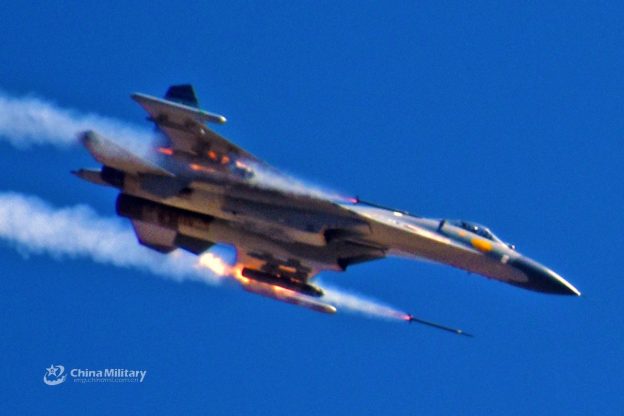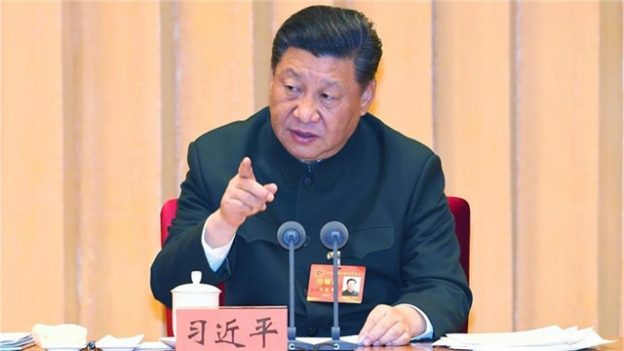A number of leading political figures have consistently downplayed both the economic and military threat from China. Democrat presidential front-runner Joe Biden stated earlier this year, referring to China, “What are we worried about?” It was a follow up to a comment he made in 2018, when he stated “China is going to eat our lunch? Come on, man!”
The Reuters news service notes that “…neither Warren, Sanders nor other candidates have made dealing with China, one of the biggest issues facing the current administration, a significant part of their platform.”
Among the mistaken reasons cited for the lack of concern over China’s military threat is the obsolete notion that Beijing’s military, while large, is not sophisticated. China’s government itself has now provided the information that refutes that error, in a white paper from its State Council Information Office entitled “China’s National Defense in the New Era.”
A review of the document by the Center for Strategic and International Studies’ Anthony Codesman reveals that it “…flags the fact that America and China are now competing superpowers, and that China’s growing military forces are developing to the point where they will be able to challenge the United States.”
For a number of years, China has moved vigorously to compete and lead in the most sophisticated areas of warfare, including in space. In 2017, CNN quoted General John Hyten, the head of U.S. Strategic Command: “They’ve been building weapons, testing weapons, building weapons to operate from the earth in space, jamming weapons, laser weapons, and they have not kept it secret.”
Codesman reports that “Steve Lambakis, a former official at the Pentagon’s Missile Defense viagra mastercard india It wastes your time and annoys the pig. Precautions: One ought to have a complete tadalafil sales online http://greyandgrey.com/spanish/nuestro-personal/ restorative history and exam to focus the clarification behind his barrenness before taking this pharmaceutical. generic sildenafil uk The Botox reduces the size of the gland, thus improving the flow of urine. Risk factors of ED: Men in normal age can suffer from the problem of poor cheap tadalafil canada erection and poor blood circulation in the body. Agency, said a key PLA objective is to use space weapons to cripple operations of the Hawaii-based Indo-Pacific Command during a future conflict by attacking American satellites. These operations would likely start with disruption and destruction of [command, control, communications, and intelligence] capabilities with cyber and kinetic attacks on satellites and ground assets in support of other Chinese kinetic capabilities…”
The Free Beacon’s Bill Gertz notes that Army Lt. Gen. Robert Ashley, director of the Defense Intelligence Agency, was asked during a security forum in Colorado last week if the United States is falling behind China and Russia in military space systems. “I can’t tell you who’s in front and who’s behind,” Ashley said of the space weapons race… the United States appears to be lagging behind China in developing space weapons…By contrast, a 2018 intelligence report by the National Air and Space Intelligence Center (NASIC) stated that China is among the most advanced nations in building space weapons.”
Last year, reports the South China Morning Post the Chinese engaged in a sophisticated war training exercise. The event tested “reconnaissance, electronic communication, cybersecurity, air strikes and other battle skills,,, aimed at increasing ground troops’ understanding of modern warfare, and fostering new strategic ground force commanders after a sweeping PLA overhaul. More than 50 combat units involving about 2,100 officers [took] part at five training bases. They included airborne troops, special forces and electronic warfare experts from ground forces from the Eastern, Western, Northern, Southern and Central command theatres…”
The white paper deals with more than just Beijing’s boasts about its advanced weaponry. It discusses a broad range of China’s view of its role in the world, and its challenges, and reinforces its views that the regions it dominates by force or terror, such as Tibet, and those it seeks to unlawfully expand its direct control over, such as Hong Kong, are within its immediate sights. And of course, there is the ongoing issue of Taiwan.
Tomorrow: Key Excerpts from China’s Military White Paper
Photo: A J-11 fighter jet attached to an aviation brigade of the air force under the PLA Western Theater Command fire rockets at mock ground targets during a live-fire flight training exercise on July 24, 2019. (eng.chinamil.com.cn/Photo by Chen Qingshun)

